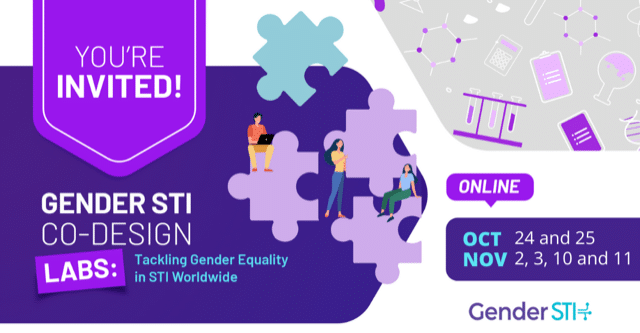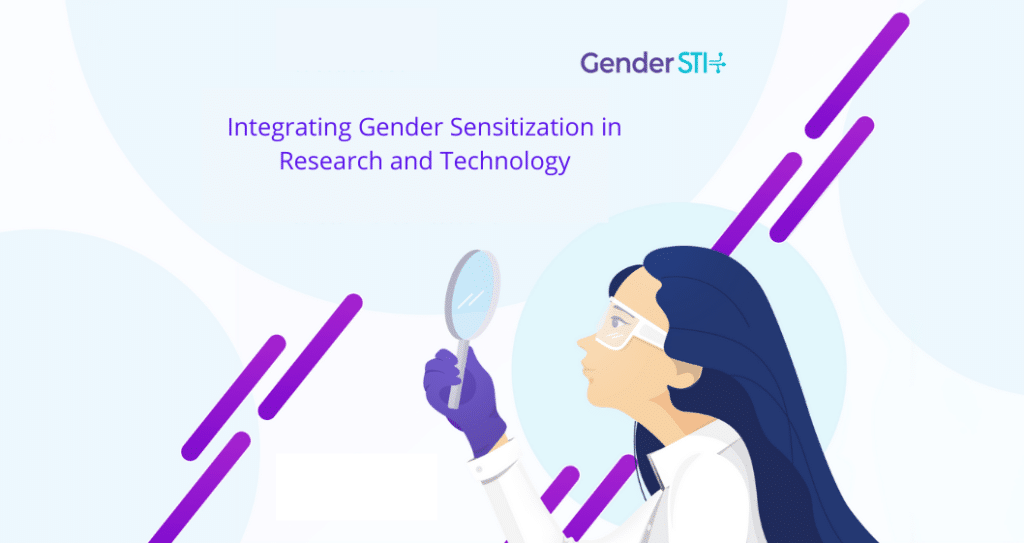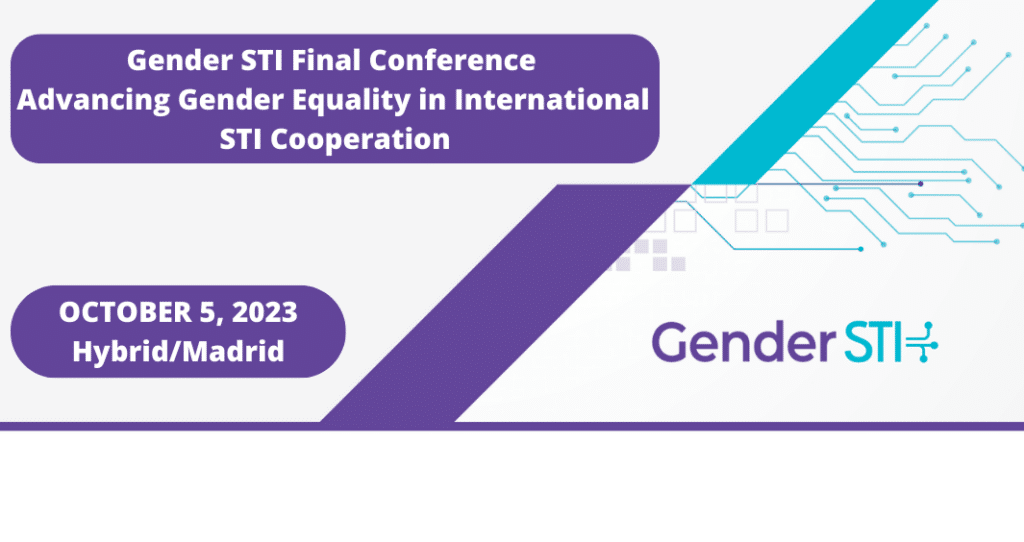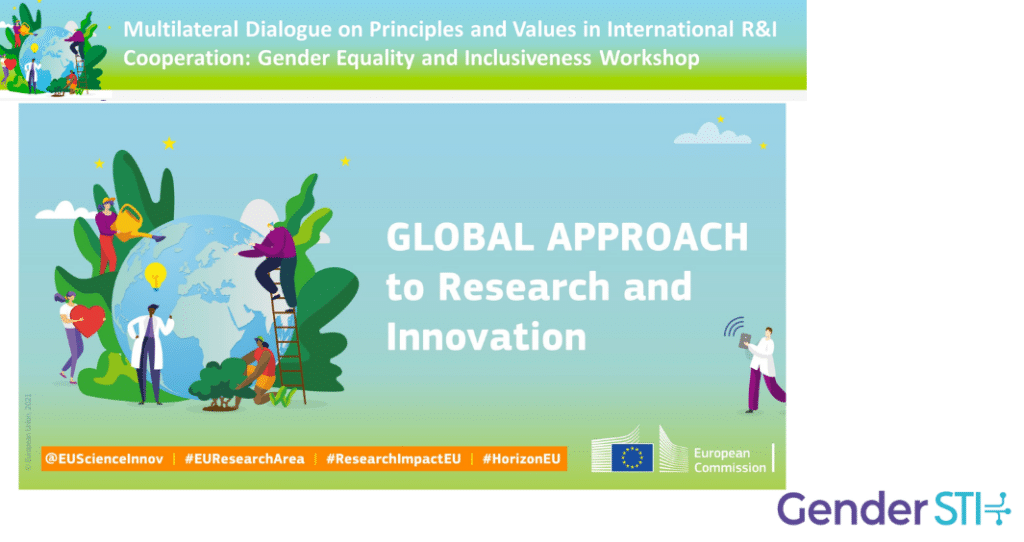Agenda
GENDER STI Co-design LAB3: sessions for participants from Asia, Africa and Europe
Session 1 - Tuesday 25th of October from 9:00 to 12:00 CET
Session 2 - Thursday 3rd of November from 9:00 to 12:00 CET
Session 3 - Friday 11th of November from 9:00 to 12:00 CET
The Co-Design Labs
Gender STI’s Co-Design Labs, which will include participants from 16 countries across four continents, focus on three of the forefront challenges facing women in science, technology and innovation (STI): gender equality in scientific careers, gender balance in decision-making bodies and positions and the integration of the gender dimension in research and innovation content.
The Lab sessions aim to identify the key issues in these areas and develop potential solutions using design thinking and online facilitated processes. Participants will discuss opportunities in their country or institution; and co-design potential solutions that can be implemented to foment greater equality in these areas in the weeks, months and years ahead.
Input from participants will contribute to a roadmap with recommendations that will be presented to the European Commission and shared with other decision makers from different countries interested in gender equality. All participants will be included as contributors to this roadmap, which will also be featured in the project’s European Observatory on Gender in STI.
Challenges to be Addressed
Challenge 1 – Gender equality in scientific careers at all levels: The challenge is to attract more women to the STI field. Gender equality is always in focus, but by creating an inclusive and diverse work environment, it is also possible to promote women who experience more than one discrimination. However, it is not about changing women but rather about creating an environment in which everyone has the opportunity to contribute. It is time to do diverse research, to create technology for all to get the best results.
Theme: Retaining women in STI.
Main Questions:
- What changes support young women to retain in STI academia?
- How can STI policy reduce the dropout rate?
- What funding mechanisms are needed to support women in a STI work environment to be more diverse and inclusive?
Challenge 2 – Gender balance in decision-making bodies and positions: Women are underrepresented in decision-making processes and positions in areas such as politics, STI advisory groups and business. Increases in women’s political power are not uniform. Some women have more influence than others, both within and between countries. Men continue to dominate some sectors and the most powerful positions in society. Reasons for the persistent under representation and low participation of women are broad and multifaceted. Root causes include traditional gender roles and stereotypes as well as unequal sharing of household and care responsibilities.
Theme: Supporting women in decision-making.
Main Questions:
- What are the evident but intangible barriers that prevent women from achieving high professional positions and how can they be faced?
- What are the needs and the role of women in decision-making bodies?
- How can new spokespeople, champions and ambassadors of gender be promoted in STI?
Challenge 3 – Integration of the gender dimension in research and innovation content: Despite decades of gender equality interventions and steadily increasing number of female workers in the STI fields, R&I content is still largely not reflecting the gender dimension. One of the reasons for this is that despite increasing diversity, the research and science cultures within STI fields are not inclusive. This means that the diversity of viewpoints employees within the STI fields may have, are not reflected in the R&I content.
Theme: Enhancing inclusive knowledge production cultures in STI.
Main questions:
- How can gender dimension be integrated into STI policy as a matter of scientific excellence?
- How can research institutions and researchers facilitate cultures of inclusive knowledge production?
- How can research institutions’ management contribute to diversity and inclusion at the workplace?
Schedule of Session 1 – Tuesday 25th of October from 9:00 to 12:00 CET
Main Goal: Opening, meet and greet. Join the challenge group. Explore the challenges.
- Plenary introduction. Organizers will describe the Gender STI challenges and introduce the lab method and schedule.
- Meeting the groups. The participants break out into three challenge groups.
- Exploring challenges and opportunities. Deepen understanding and reframing the challenges.
- Plenary closing and next steps. Talk about what’s expected in lab 2 on the next day.
- Asynchronous assignment: Explore the opportunities and generate the first ideas (over 1 week).
Schedule of Session 2 – Thursday 3rd of November from 9:00 to 12:00 CET
Main goal: Deepen understanding on ideas and opportunities. Build initial prototypes. Revisit opportunities.
- Plenary opening and check-in. Introduce the aim of the day’s session and schedule.
- Focused reflection. Feedback on the opportunities and new ideas.
- Build initial prototypes. Converge ideas to create initial prototypes emerging from the reflection on the challenges, ideas and opportunities.
- Feed forward instructions to work asynchronously in Basecamp and collaborative tools. Roadmapping the next 6 weeks, 6 months and 6 years.
- Plenary wrap-up of lab 2. Introduction to the next steps.
- Asynchronous assignment: Prototype improvement, building and testing. Thinking forward (over 1 week).
Schedule of Session 3 – Friday 11th of November from 9:00 to 12:00 CET
Main goal: Roadmap finalization and presentation of proposals
- Plenary opening and check-in. Introduce the aim of the day’s session and schedule.
- Alignment in groups to fine tune the presentations of the proposals. Groups that have worked asynchronously share briefly their findings and decide how to present them.
- Plenary presentation of the proposals in a roadmap. Proposals of prototypes are presented indicating a roadmap of activities.
- Challenge groups reflect and renew on what we have learned. Participants reflect on the prototypes and on the lessons learned.
- Plenary launch of the GO, NO-GO prototyping phase. Discuss the asynchronous prototype implementation.
– Concluding plenary. The ways forward to prototyping on location.



